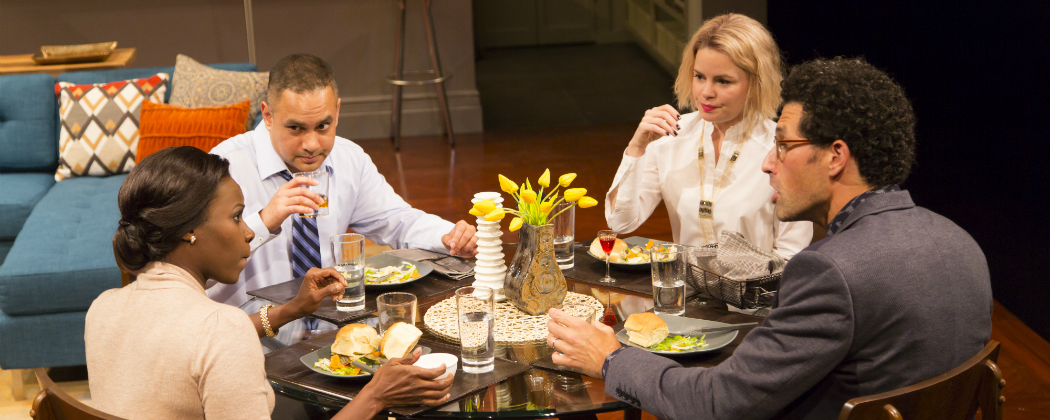Advertisement
Pulitzer-Winning 'Disgraced' Pushes Buttons You Didn't Know You Had

“Disgraced” is a bombshell in a nutshell, a manipulative but nonetheless powerful 90-minute theater piece in which a sophisticated Manhattan dinner party detonates into tribal warfare, multicultural bigotry and out-and-out savagery. Pass the fennel and anchovy salad, then duck and cover.
Ayad Akhtar’s 2013 Pulitzer Prize-winning play, seen here in a satisfactory production by the Huntington Theatre Company and Long Wharf Theatre (at the Boston University Theatre through Feb. 7), is more topical and incendiary than when it debuted in Chicago in 2012. At that time 9/11 was a decade behind us; now the Paris attacks are barely yesterday’s news and Donald Trump is fanning the flames. So novelist (“American Dervish”), screenwriter (“The War Within”) and dramatist Akhtar’s exploration of Muslim-American identity in the dual shadows of Islamophobia and ingrained religious and cultural attitudes is all the more impactful.
Upon its debut, the Chicago Sun-Times compared “Disgraced” to a minefield “that feels all too deliberately booby-trapped by the playwright.” And there is truth in that assessment: I didn’t buy every interpersonal development necessary to take this juggernaut where it needed to go, and a neat connection between Western art and subjugation seems awfully studied. Still, the “booby-trapping” is so skillfully and intelligently done that the explosions, when they come, are both provocative and shocking. The play is meant to impel a conversation, and it will.
“Disgraced” — whose title has two meanings that bump each other at the end — depicts a quartet of affluent, culturally mixed and matched New Yorkers pursuing a four-way friendship. But it centers on Amir, a tough, ambitious corporate lawyer who adamantly rejects the Muslim faith in which he was raised by Pakistani immigrant parents. So thoroughly does he wish to assimilate — and embrace a more rational and modern worldview — that he has changed his surname and married WASPy blonde artist Emily, who, ironically, has given up landscape painting to immerse her recent work in Islamic influences. The play’s other pair comprises Amir’s African-American colleague, Jory, and her Jewish art-curator spouse, whose favor could propel Emily’s career.

The fifth wheel, Amir’s 22-year-old nephew Hussein Malik, who is calling himself Abe Jensen, at first seems a mere catalyst. With Emily’s help, “Abe” persuades Amir, against his better judgment, to appear in court with an imam accused of raising money for terrorists — which leads to problems with the pro-Israel founding fathers of Amir’s law firm. But once the worst has sprung, the character, once again Hussein and wearing a Muslim skullcap, reappears, eager to redeem his people from Western colonial oppression and possibly ripening for jihad.
Certainly “Disgraced” is not the first play in which a civilized repast among the educated class disintegrates into a booze-fueled brawl. From Euripides’ “The Bacchae” to Yasmina Reza’s “God of Carnage,” that’s been happening onstage for 2,500 years. But Akhtar’s drama has more nuance and brutal candor than most. Its self-described “apostate” Muslim (who passes for Indian at his law firm) describes the religion of his youth as “a backward way of thinking. And being” but also cops to an iota of pride when the twin towers fell. “Pride about what?” Jory asks incredulously. “That we were finally winning,” the tribally imprinted if vehemently lapsed Muslim admits.
But Amir is not the only character to learn crippling truths about himself. Emily must face the naiveté of her insistent embrace of Islam’s softer side (while inadvertently illustrating its derisive view of “white” women). Isaac and Jory also exit the carnage with decisive rents in their liberal philosophies and companionable relationship — though the playfully jarring pair does help keep things breezy on the surface while Akhtar buries his mines.

Gordon Edelstein’s production, which played at Long Wharf Theatre (where the helmsman is artistic director) last fall and continues at the Huntington, is both slickly opulent and well played (if a little shaky at the climax). Lee Savage’s tastefully appointed apartment, presided over by a vivid blue, Islamic-garden-patterned painting, looks, in grand Huntington tradition, ready to move into — if only you had the money. David Van Tieghem’s musical design is apprehensive and somber. And the performances aptly combine intensity with urbane festivity, all the better to devolve from.
Rajesh Bose gives an unflinching performance as Amir, dizzyingly certain in his apostasy and his $600 shirts before being violently hoist on his own petard. Benim Foster’s long, tall Isaac is all bonhomie and alpha-male provocation, Nicole Lowrance’s Emily an ameliorative but sharp temptress whose journey is both calculated and shattering. Jory is the most cocksure but least developed character, and in the statuesque person of Shirine Babb she’s a force not to be ignored. As Hussein/Abe, Mohit Gautam makes a convincingly inchoate Muslim youth, teetering, like so many things in our fearful and divided culture, on the brink.
Carolyn Clay was for many years the theater editor and chief drama critic for the Boston Phoenix. She is a past winner of the George Jean Nathan Award for Dramatic Criticism.
